| Dagupan | |
|---|---|
| Independent component city | |
| City of Dagupan | |
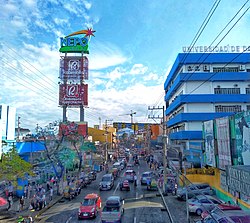     Clockwise from top: Downtown Dagupan, Metropolitan Cathedral of Saint John the Evangelist, CSI Malls (City Supermarket, Inc.), Dagupan Train Museum, Dagupan City Park Clockwise from top: Downtown Dagupan, Metropolitan Cathedral of Saint John the Evangelist, CSI Malls (City Supermarket, Inc.), Dagupan Train Museum, Dagupan City Park | |
 Flag Flag Seal Seal | |
| Nickname(s): Bangus (Milkfish) Capital of the Philippines Kitchen of the North | |
| Anthem: Dagupan Hymn | |
 Map of Pangasinan with Dagupan highlighted Map of Pangasinan with Dagupan highlighted | |
| OpenStreetMap | |
 | |
| Coordinates: 16°02′35″N 120°20′02″E / 16.043°N 120.334°E / 16.043; 120.334 | |
| Country | Philippines |
| Region | Ilocos Region |
| Province | Pangasinan (geographically only) |
| District | 4th district |
| Founded | 1590 |
| Cityhood | June 20, 1947 |
| Barangays | 31 (see Barangays) |
| Government | |
| • Type | Sangguniang Panlungsod |
| • Mayor | Belen T. Fernandez (Aksyon Demokratiko) |
| • Vice Mayor | Dean Bryan L. Kua (Aksyon Demokratiko) |
| • Representative | Christopher P. de Venecia (Lakas–CMD) |
| • City Council |
Members
|
| • Electorate | 138,721 voters (2022) |
| Area | |
| • Total | 44.47 km (17.17 sq mi) |
| Elevation | 18 m (59 ft) |
| Highest elevation | 461 m (1,512 ft) |
| Lowest elevation | 0 m (0 ft) |
| Population | |
| • Total | 174,302 |
| • Density | 3,900/km (10,000/sq mi) |
| • Households | 42,017 |
| Demonym(s) | Dagupeño (masculine) Dagupeña (feminine) Dagupenean |
| Economy | |
| • Income class | 2nd city income class |
| • Poverty incidence | 14.40% (2021) |
| • Revenue | ₱1,915,874,700.93 (2022) |
| • Assets | ₱ 3,591 million (2022) |
| • Expenditure | ₱ 952.7 million (2022) |
| • Liabilities | ₱ 701.3 million (2022) |
| Service provider | |
| • Electricity | Dagupan Electric Corporation (DECORP) |
| Time zone | UTC+8 (PhST) |
| ZIP code | 2400 |
| PSGC | 0105518000 |
| IDD : area code | +63 (0)75 |
| Native languages | Pangasinan Ilocano Tagalog |
| Website | dagupan |
Dagupan [dɐˈgupan], officially the City of Dagupan (Pangasinan: Siyudad na Dagupan, Ilocano: Siudad ti Dagupan, Filipino: Lungsod ng Dagupan), is a 2nd class independent component city in the Ilocos Region, Philippines. According to the 2020 census, it has a population of 174,302 people.
Located on Lingayen Gulf on the northwest-central part of Luzon, Dagupan is a major commercial and financial center north of Manila. Also, the city is one of the centers of modern medical services, education, media and communication in North-Central Luzon. The NEDA-Regional Development Council officially establishes Dagupan as a regional center. The city is situated within the fertile Agno River Valley and is in turn a part of the larger Central Luzon plain.
The city is among the top producers of milkfish (locally known as bangus) in the province. From 2001 to 2003, Dagupan's milkfish production totaled to 35,560.1 metric tons (MT), contributing 16.8 percent to the total provincial production. Of its total production in the past three years, 78.5 percent grew in fish pens/cages while the rest grew in brackish water fishponds.
Dagupan is administratively and politically independent from the provincial government of Pangasinan and is only represented by the province's legislative district. And also, it is the second most-populous city in that province and in Ilocos Region after San Carlos City.
Dagupan is one of the proposed metropolitan area in the Philippines. Metro Dagupan is proposed to include the independent component city of Dagupan, as well as the towns of Binmaley, Calasiao, Lingayen, Manaoag, Mangaldan, Mapandan, San Fabian, San Jacinto, and Santa Barbara.
Etymology
The city's name was derived from the local Pangasinan word pandaragupan which means gathering place as the city has been a regional market center for centuries. The root word is dagop, Pangasinan term of gather.
History
Pangasinan
See also: Pangasinan (historical polity)By the 15th century, Pangasinan was an ancient coastal region composed of various settlements, whose paramount leaders sent emissaries to China in 1406–1411.
Spanish period
The area that is now known as Dagupan was described as marshland thickly covered with mangrove and nipa palm trees. The natives lived along the shoreline and riverbanks of Calmay, Pantal, and Bonuan. But there were also communities in Malued, Lasip, Pogo, and Bacayao. The natives called the area Bacnotan which would later be incorporated into the encomienda of Lingayen that was established in 1583.
The first long distance railroad in the Philippines connecting Manila and Dagupan was opened on November 24, 1892.
Japanese occupation
The Japanese planes bombed in Dagupan in December 1941; Dagupan was occupied by Japanese forces starting in 1942. The city also served as a wartime capital of Pangasinan.
Allied liberation

On January 8–9, 1945, U.S. General Douglas MacArthur landed his amphibious liberation force in the city's "Blue Beach" section in Bonuan Gueset along the shores of Lingayen Gulf. From his beachhead in Dagupan, along with those in neighboring towns Lingayen, Binmaley and San Fabian, MacArthur's forces under General Walter Krueger together with the Philippine Commonwealth troops under the Philippine Army and Philippine Constabulary units were able to penetrate Japanese defenses in Luzon island and liberate Filipino and allied prisoners of war near Cabanatuan in the province of Nueva Ecija, and in Manila's University of Santo Tomas, among others.
Cityhood
Main article: Cities of the PhilippinesDagupan became a city by virtue of Republic Act No. 170, authored by House Speaker Eugenio Pérez. It was signed into law by President Manuel Roxas on June 20, 1947.
Contemporary history
The westward expansion of the city went as far as Lucao, which was also swampland. Local historian Restituto Basa surmised that the name Lucao may have been derived from the shellfish called lukan that used to abound in the swampy area.
In June 1962, Dagupan was shaken by a series of strong earthquakes which occurred at irregular intervals for about three weeks. The quakes toppled the belfry of the Roman Catholic church. Many people from Calmay, Carael and island barrios evacuated to other towns.
In 1968, the national government agencies opened offices in Dagupan and other key cities across the country. The daytime population increased substantially, causing congestion in the city that began to see the appearance of public utility tricycles and other modes of transportation.
On July 16, 1990, a magnitude 7.7 earthquake struck northern Luzon, causing liquefaction, which made buildings tilt and sink due to their heavy weight and the looseness of the ground, which turned into sediment-rich mud. The Magsaysay Bridge, one of the two bridges especially spanning the Pantal River, collapsed, delaying people from crossing to the other banks and vice versa. Major damage caused businesses to be permanently transferred to the neighbouring towns of Mangaldan and Calasiao, but somehow, Dagupan and its inhabitants managed to recover from the earthquake.
At the turn of the millennium, seeking to promote the thriving milkfish industry that harnessed the city as the milkfish capital of the country, The Bangus Festival was formally launched in 2002 by then-Mayor Benjamin Lim. The city earned the World's Longest Barbecue record from the Guinness World Records in 2003 during the holding of the Kalutan ed Dalan where 10,000 pieces of bangus were grilled on the longest barbecue grill measuring 1,007.56 meters long.
Geography
Dagupan covers a total land area of 4,447.10 hectares (10,989.0 acres), bounded by Lingayen Gulf in the north, San Fabian in the northeast, Mangaldan in the east, Calasiao in the south and Binmaley in the west. Land use is primarily for agriculture with 35.98% of the total land area, fishpond, cropland, residential with 22.88%; others uses are commercial, industrial, institutional, government private, parks and roads.
Dagupan is 14 kilometers (8.7 mi) from Lingayen, the capital of Pangasinan, and 220 kilometers (140 mi) from Manila.
 Panoramic view of Dagupan river
Panoramic view of Dagupan river
Barangays
Dagupan is politically subdivided into 31 barangays. Each barangay consists of puroks and some have sitios.
|
|
Climate
| Climate data for Dagupan (1991–2020, extremes 1903–2012) | |||||||||||||
|---|---|---|---|---|---|---|---|---|---|---|---|---|---|
| Month | Jan | Feb | Mar | Apr | May | Jun | Jul | Aug | Sep | Oct | Nov | Dec | Year |
| Record high °C (°F) | 36.0 (96.8) |
37.0 (98.6) |
38.7 (101.7) |
39.9 (103.8) |
39.6 (103.3) |
38.7 (101.7) |
38.2 (100.8) |
36.4 (97.5) |
36.6 (97.9) |
37.2 (99.0) |
36.9 (98.4) |
36.9 (98.4) |
39.9 (103.8) |
| Mean daily maximum °C (°F) | 30.7 (87.3) |
31.5 (88.7) |
32.9 (91.2) |
34.4 (93.9) |
34.0 (93.2) |
33.3 (91.9) |
31.9 (89.4) |
31.1 (88.0) |
31.5 (88.7) |
31.9 (89.4) |
31.8 (89.2) |
31.0 (87.8) |
32.2 (90.0) |
| Daily mean °C (°F) | 25.9 (78.6) |
26.4 (79.5) |
27.8 (82.0) |
29.5 (85.1) |
29.5 (85.1) |
29.0 (84.2) |
28.1 (82.6) |
27.7 (81.9) |
27.9 (82.2) |
28.0 (82.4) |
27.6 (81.7) |
26.6 (79.9) |
27.8 (82.0) |
| Mean daily minimum °C (°F) | 21.0 (69.8) |
21.4 (70.5) |
22.8 (73.0) |
24.5 (76.1) |
25.0 (77.0) |
24.8 (76.6) |
24.4 (75.9) |
24.4 (75.9) |
24.3 (75.7) |
24.2 (75.6) |
23.4 (74.1) |
22.2 (72.0) |
23.5 (74.3) |
| Record low °C (°F) | 14.3 (57.7) |
16.3 (61.3) |
16.7 (62.1) |
19.7 (67.5) |
19.0 (66.2) |
20.2 (68.4) |
20.4 (68.7) |
19.0 (66.2) |
20.5 (68.9) |
19.5 (67.1) |
17.2 (63.0) |
15.2 (59.4) |
14.3 (57.7) |
| Average rainfall mm (inches) | 5.7 (0.22) |
9.5 (0.37) |
23.0 (0.91) |
69.5 (2.74) |
218.2 (8.59) |
335.5 (13.21) |
532.7 (20.97) |
619.5 (24.39) |
401.6 (15.81) |
226.6 (8.92) |
54.9 (2.16) |
20.0 (0.79) |
2,516.7 (99.08) |
| Average rainy days (≥ 1.0 mm) | 2 | 2 | 3 | 4 | 11 | 16 | 20 | 21 | 19 | 9 | 5 | 3 | 115 |
| Average relative humidity (%) | 81 | 81 | 79 | 79 | 81 | 84 | 87 | 88 | 87 | 85 | 83 | 82 | 83 |
| Source: PAGASA | |||||||||||||
Dagupan has a tropical monsoon climate (Köppen climate classification: Am). It is in Type I climate zone in the Modified Coronas' Climate Classification, with a pronounced dry season from November to April.
Demographics
|
|
| ||||||||||||||||||||||||||||||||||||||||||||||||||||||
| Source: Philippine Statistics Authority | ||||||||||||||||||||||||||||||||||||||||||||||||||||||||
In Dagupan, the Pangasinans are the predominant people and a minority of residents are dominantly Ilocanos. Number of Registered Voters (2016): 105,183
Languages
Pangasinan is predominantly used in the city and environs, followed by Tagalog and English, as well as Ilocano, mainly in Calmay and Pantal.
Chinese is mainly spoken only by a few city individuals of Chinese descent.
Economy

Poverty incidence of Dagupan
|
5
10
15
20
2006 15.70 2009 13.93 2012 5.96 2015 9.21 2018 9.19 2021 14.40 Source: Philippine Statistics Authority |
Dagupan is the economic center of Pangasinan. As a major regional hub, many people in Pangasinan and nearby provinces commute to the city during the day; this causes the city's daytime population to rise and cause traffic in parts of the city, especially the downtown area. The city is a vital financial center housing numerous banks, non-bank financial institutions, headquarters of corporations and offices of major government departments and agencies.

Historically, Dagupan was a center for salt making in numerous salt evaporator beds in the low-lying swampy areas close to Lingayen Gulf. Beginning in the 19th century, some of the salt making operations gave way to pond culture of fish, most prominently, the milkfish (locally known as bangus), for which the city has become famous. Fisheries, aquaculture and processed fisheries products are an important mainstay of the city's economy.

Manila-based developers have set up shop in Dagupan due to its strategic location and growing population. These include Santa Lucia Land Inc. (Almeria Verde Subdivision), SM Prime Holdings, and Filinvest.
As of June 2020, Dagupan is one of the 25 cities in the Philippines identified as an area with "high-potential in IT-BPM industry" for transformation into "digital cities" by 2025. Sitel, a global business process outsourcing (BPO) firm, has opened in 2020 its first Sitel MAXhub in Dagupan.
The motor vehicle industry of Dagupan is centered around Caranglaan and Lucao districts. Many well-known automotive companies have a dealership in the city's metropolitan area.
Tourism
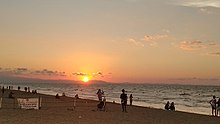
Dagupan is a historic city that boasts numerous historical, cultural heritage, recreational, ecotourism, business, and culinary tourism of national importance.
Being at the center of trade in the north for centuries blessed with a geography crisscrossed by several rivers and sandy beaches, Dagupan has naturally become a multifaceted city in terms of tourism. Also, as the transportation hub of Pangasinan, the city is easily accessible to the public, whether coming from within or outside of the province.
Historical & Heritage Tourism
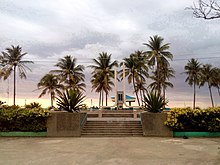
Since the Spanish colonial times, the colonial government had put a great emphasis on the importance of the city due to being at the strategic center of the province and its accessibility to the sea for trading and transport. The first Philippine railroad system, the Manila-Dagupan railway, had its terminus in the city. Remnant of the historic rail transport locomotive can be seen displayed in front of the city museum.
During World War 2, Dagupan also served as the wartime capital of Pangasinan. The shores of Bonuan Gueset was a silent witness to the historic landing of Gen. MacArthur that eventually became one of the key historic points in the country's liberation. To immortalize this important feat in the city's history, a MacArthur Landing Park was built to stand by the shore of Tondaligan Beach, adjacent to Filipino-Japanese Peace Park.
More structures and landmarks of historic importance still dot the city, some of which are already listed as heritage sites by the National Historical Commission of the Philippines (NHCP). These include:
• Home Economics/Gabaldon Building at West Central Elementary School
• Old City Hall and Water Tower
• Metropolitan Cathedral of Saint John
• Philippine National Railways Tracks and Station
• Remnants of Franklin Bridge
• Lighthouse in Bonuan
Food Tourism

Aside from being the Bangus Capital of the Philippines, the city is also known as the Kitchen of the North. Many popular culinary traditions have originated in the city, including Pigar-Pigar, Kaleskes, and Bonuan Boneless Bangus. Plato Wraps, a contemporary food innovation that's now popularly sold in major shopping malls also hails from the city.
Dagupan is home to popular homegrown restaurants that branched out in many parts of Luzon.
Food Hubs:
• Metro Plaza (International and national food and resto chains)
• Galvan Street (The center for local Dagupan cuisines such as Pigar-Pigar, Kaleskes and other native dishes)
• Tondaligan Food Hub (Alfresco dining by the beach hosting native delicacies, street foods and selected food kiosks)
• Dagupan City Growth Center-Lucao (A modern lifestyle center and food hub by the river hosting popular restaurants & cafes)
• Plaza Del Carmen (Hosts traditional and innovative cafes, bars and restaurants)
• Royal Rays Food Hub (A hub for Filipino and Asian dining)
Ecotourism
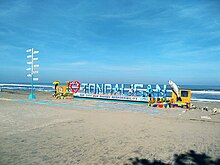
Dagupan, being surrounded by rivers and sea, offers extensive ecotourism activities for recreation, relaxation and adventure.
Tondaligan Beach is an urban beach park complex with numerous amenities. The extensive Tondaligan baywalk, dubbed as the longest in the region, is a prominent feature along the Bonuan shore wherein cyclists can enjoy biking and savor Lingayen Gulf's picturesque view.
Tondaligan Beach Park also hosts many historical landmark of national importance such as:
- Gen. MacArthur Landing Park
- Filipino-Japanese Friendship Garden
- Tondaligan Grand Amphitheater
Other interesting spots and landmarks in the city that can be visited are as follows:
- Dawel River Cruise
- BFAR – NIFTDC
- Pugaro Beach
- Bonuan Golf Course
- Leisure Coast Resort
Festivities
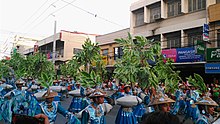
As the Bangus (Milkfish) Capital of the Philippines, Dagupan has been celebrating its well-renowned produce through Bangus Festival which started in 2002. It's a yearly month-long celebration in the month of April.
The festival features the famous bangusine (bangus cuisine) which is one of the main highlights of the event, street dancing where competing barangays parade in the city's main avenue wearing colorful Bangus Festival costumes, bangus grilling, deboning, variety shows, trade fairs, beauty pageants, sports fest, cooking show, medical mission, visual arts, band concerts, sports activities, dog show, fluvial parade, drum and lyre parade, and street party. The festival concludes every April 30 with main events: Kalutan ed Dalan in the daytime and Bangusan Street Party concerts in the nighttime.
Pista'y Dayat (Festival of the Sea) is held the day after the conclusion of Bangus Festival. It is a simultaneously celebrated festivity together with the neighboring towns in the Lingayen Gulf area. It serves as a thanksgiving for the bountiful harvest and abundant fishing from the sea in the province of Pangasinan.
Dagupan City Fiesta is a month-long celebration held every December with a Catholic fiesta mass and Procession at St. John Cathedral in honor of St. John the Evangelist, the patron saint of Dagupan and of fishermen.

Since it coincides with the Christmas festivities, Christmas decoration-building, nativity scene displays and Christmas tree using indigenous materials has become a permanent fixture in the Dagupan City Fiesta.
On The Edades Day, events such as Arts and Painting Contests are held on December 23, honoring national artist on Modern Arts Victorio Edades, a Dagupeño from Barangay Bolosan. Other events such Miss Dagupan pageant, job fairs, NGO, Organizations, & Barangay Nights, various alumni homecoming Nights, Battle of Bands, and Hip Hop Dance Contest, among others are usually parts of the festivities. The Dagupan City fiesta ends on Rizal Day at the Dagupan City Plaza.
Government

Dagupan, belonging to the fourth congressional district of the province of Pangasinan, is governed by a mayor designated as its local chief executive and by a municipal council as its legislative body in accordance with the Local Government Code. The mayor, vice mayor, and the councilors are elected directly by the people through an election which is being held every three years.
Members of the Dagupan City Council (2022–2025):
- District Representative (4th Legislative District the province of Pangasinan): Christopher George Martin P. de Venecia
- Chief Executive: Belen T. Fernandez
- Presiding Officer: Dean Bryan "BK" L. Kua
- Councillors:
- Maria Librada Fe M. Reyna
- Jeslito C. Seen
- Alvin T. Coquia
- Celia C. Lim
- Maria Lourdes S. Fernandez
- Alipio Serafin D. Fernandez
- Redford Christian P. Erfe-Mejia
- Dennis C. Canto
- Victoria Czarinna C. Lim-Acosta
- Michael B. Fernandez
- Association of Barangay Captains President: Marcelino D. Fernandez (Lucao)
- Sangguniang Kabataan Federation President: Bradley Claude C. Benavides (Caranglaan)
Transportation
Road and railway systems
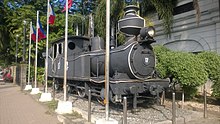
Dagupan is connected with other cities by networks of national roads. Romulo Highway and Pangasinan–La Union Road (N55) and Urdaneta-Dagupan Road (N57) are the principal highways that serve the city.
The Philippine National Railways (PNR) once served Dagupan through Dagupan station, that went defunct in the late 1980s. The first railroad in the Philippines, the Manila-Dagupan Railway, terminated at the city.
Bus
Intercity/interprovincial buses from Manila serve the city, and are usually operated by Dagupan Bus Company, Victory Liner, Five Star, and Pangasinan Solid North. Jeepneys provide intracity travel, as well as for towns and cities of close proximities.
Taxi service

Since 2019, taxi service becomes available as the newest transportation mode in the city. It is the first ever taxi operation in Region 1 and is authorized to serve Pangasinan and the entire Region 1. Dagupan was chosen as the launching area being the center of business and education in North Central Luzon.
Modern jeepney
Modern PUVs, more commonly known as modern jeepneys, now ply different parts of the city as part of the nationwide PUJ modernization campaign. They are equipped with CCTV cameras, air conditioning, a television, and equipment to comply with the government's health and safety protocols against COVID-19.
Healthcare
Medical and health service centers abound in Dagupan. Out of 51 hospitals in Pangasinan, 12 are located in the city. The largest of these is the Region 1 Medical Center with hospital bed capacity of 1000. Other notable hospitals are Dagupan Doctors Villaflor Memorial Hospital, Nazareth General Hospital, and The Medical City Pangasinan.
Education
Since the colonial era, Dagupan has always been the center of education in Ilocos Region (Region 1). The private sector-driven centers of education University of Pangasinan, Universidad de Dagupan, University of Luzon and Lyceum-Northwestern University lead, 14 colleges and 18 vocational schools and 3 technical learning centers, 19 secondary schools and 53 elementary schools both in public and private.
Universities and colleges
- Universidad de Dagupan
- University of Luzon
- University of Pangasinan
- Lyceum-Northwestern University
- Asiacareer College Foundation
- Aie College – Dagupan Campus
- AMA Computer College – Dagupan Campus
- Dagupan Colleges Foundation
- Escuela de Nuestra Señora de La Salette
- Kingfisher School of Business and Finance
- Mary Help of Christians College Seminary
- Pangasinan Merchant Marine Academy
- Pimsat Colleges
- STI College – Dagupan Campus
Public secondary schools
- Bonuan Boquig National High School
- Carael National High School
- Dagupan City National High School
- Judge Jose de Venecia Sr. Technical-Vocational Secondary School
- Salapingao National High School
- East Central Integrated School
- Pugaro Integrated School
- Federico N. Ceralde Integrated School (cj)
Private primary and secondary schools
- St. Michael School By-the-Sea
- Clifford Interactive Learning School
- Colegio de Dagupan
- Divine Word Academy of Dagupan
- Dominican School
- Ednas School
- Escuela de Nuestra Señora de La Salette
- Genesis Advanced Intech Academy
- Graystone Institute of the Philippines
- Harvent School
- Hilkan Montessori
- Instituto Centro Asia
- JCCMI Christian Academy
- La Marea Academy
- Living Lights Academy Foundation
- Francisco Q. Duque Medical Foundation Special Science High School
- Francisco Q. Duque Medical Foundation Regular High School
- Mother Goose Playskool and Gradeschool
- Mother Goose Special Science High School
- Northfield Academy
- Oakridge International School of Young Leaders
- Pangasinan Universal Institute
- St. Albert the Great School
- St. John's Cathedral School
- STI College
- Asian Institute of E-Commerce
- University of Pangasinan
- University of Luzon
- Lyceum-Northwestern University
- Wonderland School of Dagupan Inc.
Media
Dagupan is home to regional broadcasting stations and television networks. Twenty radio broadcasting stations (9 AM and 11 FM), at least seventeen local newspapers and three cable television companies operate in the city. Daily flagship regional news over free TV is served by One North Central Luzon (formerly Balitang Amianan) via GMA Dagupan Station.
TV stations
- All TV Baguio (digital: Channel 30)
- IBC Benguet (analog: Channel 6 and digital: Channel 17)
- PTV Cordillera (analog: Channel 8 and digital: Channel 42)
- GMA Dagupan (analog: Channel 10 and digital: Channel 38)
- RPN Benguet (analog: Channel 12 and digital: Channel 19)
- GTV Benguet (analog: Channel 22 and digital: Channel 38)
- Hope Channel Dagupan (analog: Channel 24 and digital: Channel 44)
- One Media Network Baguio (digital: Channel 44)
- CLTV 36 (digital: Channel 36)
- TV5 Benguet (analog: Channel 28 and digital: Channel 51)
- ANBC IMBN TV North Luzon (digital: Channel 41/Channel 47)
- DepEd TV North Luzon (digital: Channel 41.7/Channel 47.7)
- S+A Channel 30 Baguio – (defunct)
- ABS-CBN Channel 32 Dagupan – (defunct)
- A2Z Benguet (digital: Channel 32)
- Light TV (digital: Channel 32)
- One Sports Benguet (analog: Channel 36 and digital: Channel 51)
- Net 25 Benguet (digital: Channel 46)
- INC TV Benguet (digital: Channel 46)
Cable and satellite TV
- Sky Cable Dagupan
- USATV
- Cignal TV
AM stations
- DZMQ Radyo Pilipinas 576 (DZMQ; Philippine Broadcasting Service).
- DZRD Sonshine Radio 981 (DZRD; Swara Sug Media Corporation)
- DWIN 1080 Radyo Agila (DWIN; Eagle Broadcasting Corporation)
- DZWN Bombo Radyo 1125 (DZWN; Bombo Radyo Philippines/People's Broadcasting Service)
- DWCM 1161 Aksyon Radyo (DWCM; Manila Broadcasting Company/Pacific Broadcasting System)
- DZDN 1206 Life Radio Northern Luzon (DZDN; End-Time Mission Broadcasting Service)
- DWPR 1296 Radyo Pilipino (DWPR; Radio Corporation of the Philippines)
- DZRH Nationwide 1440 (DWDH; Manila Broadcasting Company)
- GMA Super Radyo DZSD 1548 (Relay station of DZBB 594 Manila) (DZSD; GMA Network, Inc.)
FM stations
- 88.1 Radyo Pangasinan (DWJE; Pangasinan Gulf Waves Network Corporation, a former frequency of 95.3 FM from 2019 to 2021)
- DWIZ 89.3 (DWIZ; Aliw Broadcasting Corporation, a former branding as Home Radio from 2009 to 2013)
- 90.3 Energy FM (DWKT; Ultrasonic Broadcasting System)
- 93.5 Barangay FM (DWTL; GMA Network, Inc.)
- MOR 94.3 (DWEC; ABS-CBN Corporation – defunct)
- 98.3 Love Radio (DWID; Manila Broadcasting Company)
- 100.7 Star FM (DWHY; Bombo Radyo Philippines/People's Broadcasting Service)
- 101.5 Brigada News FM (DWYA; Brigada Mass Media Corporation/Baycomms Broadcasting Corporation)
- 104.7 iFM (DWON; Radio Mindanao Network)
- 106.3 Yes The Best (DWHR; Manila Broadcasting Company/Pacific Broadcasting System)
- 107.9 DWHT (DWHT; Broadcast Enterprises and Affiliated Media)
Seventeen local newspapers in Northern Luzon.
News and public affairs programs:
- Bagong Morning Kapamilya and TV Patrol North Luzon (ABS-CBN TV-32 Dagupan; former)
- Headline Ng Balita North Luzon (ANBC IMBN DTV41/DTV 47 North Luzon)
- NewsForce North Luzon (One Media TV44 North Luzon)
- LUZON HEADLINES (Highland TV / RNG Luzon )
- Kangrunag A Damag (PTV-8 Cordillera)
- One North Central Luzon and Mornings with GMA Regional TV (GMA Dagupan).
Notable Personalities
- Marion Magat - Professional Basketball Player
- Jose Esteves - American Politician, former mayor of Milpitas, California
- Jose de Venecia Jr. - Former Speaker of the House of Representatives of the Philippines
- Cheryl Cosim - News Anchor
- Julius Babao - News Anchor
- Antonio Aquitania - Filipino actor
Sister cities
 Guadalajara, Jalisco, Mexico
Guadalajara, Jalisco, Mexico Iwata, Shizuoka, Japan
Iwata, Shizuoka, Japan Milpitas, California, United States
Milpitas, California, United States Tangier, Tanger-Tetouan-Al Hoceima, Morocco
Tangier, Tanger-Tetouan-Al Hoceima, Morocco Cabanatuan, Philippines
Cabanatuan, Philippines
References
- Visperas, Eva (January 29, 2017). "Dagupan makes strides in bangus deboning". The Philippine Star. Archived from the original on January 28, 2017. Retrieved April 19, 2019.
- Cardinoza, Gabriel (September 24, 2014). "Dagupan City: 'Kitchen of the North'". Philippine Daily Inquirer.
- de Venecia, Toff (June 29, 2021). "Eating is more fun in Fun-gasinan". Manila Bulletin.
- City of Dagupan | (DILG)
- "Our City, Our Shared Responsibility". The Official Website of the City of Dagupan, Philippines.
- ^ Census of Population (2020). "Region I (Ilocos Region)". Total Population by Province, City, Municipality and Barangay. Philippine Statistics Authority. Retrieved 8 July 2021.
- "PSA Releases the 2021 City and Municipal Level Poverty Estimates". Philippine Statistics Authority. 2 April 2024. Retrieved 28 April 2024.
- "Dagupan City Executive Summary" (PDF). Commission on Audit. 2022.
- "Dagupan City". Official Website of the Province of Pangasinan and its People. Archived from the original on June 27, 2017. Retrieved January 28, 2017.
- "RDC-1 Approves NLGC Strategic Plan, Ilocos Development Report and Resolutions for Socio-Economic Growth in Region 1".
- "Dagupan City: The Home of the World's Longest Barbecue". National Statistical Coordination Board. Archived from the original on July 26, 2014. Retrieved May 30, 2012.
- "New Metropolis Rising in Pangasinan". Wow Dagupan Today. January 7, 2011.
Dagupan Metropolitan Area or Metro Dagupan (DMA) is a metropolitan area in north central Luzon.
- Scott, William Henry (1989). Filipinos in China in 1500 (PDF). China Studies Program. De la Salle University. p. 8. Archived (PDF) from the original on July 24, 2015. Retrieved July 24, 2015.
- "Dagupan City". Philippine Islands. Archived from the original on December 8, 2015. Retrieved November 27, 2015.
- "The July 16 Luzon Earthquake: Dagupan City, A Case Study". Philippine Institute of Volcanology and Seismology. Retrieved July 27, 2019.
In 1590, the house clusters were resettled into compact communities and converted into a town named initially as Bacnotan and renamed later in 1720 as Dagupan.
- "Reporter Predicted Japanese Attack". lindseywilliams.org. December 8, 1971. Archived from the original on October 8, 2015. Retrieved November 27, 2015.
- Visperas, Eva & Ramirez, Cesar (January 10, 2017). "MacArthur landed in Dagupan, not Lingayen". The Philippine Star. Retrieved July 27, 2019.
- Cosgrove, Ben (November 10, 2014). "LIFE With MacArthur: The Landing at Luzon, the Philippines, 1945". TIME. Archived from the original on November 18, 2014. Retrieved July 27, 2019.
- "Republic Act No. 170 – An Act Creating the City of Dagupan". Chan Robles Virtual Law Library. Retrieved January 31, 2016.
- Cardinoza, Gabriel (July 24, 2012). "Dagupan Rises From 1990 Nightmare". Philippine Daily Inquirer.
- Austria, Hilda (May 1, 2022). "Dagupan's Bangus Festival is back". Philippine News Agency.
- ^ "Municipality/City: Dagupan City". PSGC Interactive. Archived from the original on May 10, 2012. Retrieved May 29, 2012.
- "Dagupan City, Pangasinan Climatological Normal Values" (PDF). Philippine Atmospheric, Geophysical and Astronomical Services Administration. Archived from the original (PDF) on October 11, 2018. Retrieved October 11, 2018.
- "Dagupan City, Pangasinan Climatological Extremes". Philippine Atmospheric, Geophysical and Astronomical Services Administration. Archived from the original on October 11, 2018. Retrieved October 11, 2018.
- Census of Population (2015). "Region I (Ilocos Region)". Total Population by Province, City, Municipality and Barangay. Philippine Statistics Authority. Retrieved 20 June 2016.
- Census of Population and Housing (2010). "Region I (Ilocos Region)" (PDF). Total Population by Province, City, Municipality and Barangay. National Statistics Office. Retrieved 29 June 2016.
- Censuses of Population (1903–2007). "Region I (Ilocos Region)". Table 1. Population Enumerated in Various Censuses by Province/Highly Urbanized City: 1903 to 2007. National Statistics Office.
- "Province of". Municipality Population Data. Local Water Utilities Administration Research Division. Retrieved 17 December 2016.
- History of Dagupan
- Pangasinan Dialect is Medium of Instruction in Nearly All Schools of Dagupan
- "Poverty incidence (PI):". Philippine Statistics Authority. Retrieved December 28, 2020.
- "Estimation of Local Poverty in the Philippines" (PDF). Philippine Statistics Authority. 29 November 2005.
- "2003 City and Municipal Level Poverty Estimates" (PDF). Philippine Statistics Authority. 23 March 2009.
- "City and Municipal Level Poverty Estimates; 2006 and 2009" (PDF). Philippine Statistics Authority. 3 August 2012.
- "2012 Municipal and City Level Poverty Estimates" (PDF). Philippine Statistics Authority. 31 May 2016.
- "Municipal and City Level Small Area Poverty Estimates; 2009, 2012 and 2015". Philippine Statistics Authority. 10 July 2019.
- "PSA Releases the 2018 Municipal and City Level Poverty Estimates". Philippine Statistics Authority. 15 December 2021. Retrieved 22 January 2022.
- "PSA Releases the 2021 City and Municipal Level Poverty Estimates". Philippine Statistics Authority. 2 April 2024. Retrieved 28 April 2024.
- "Dagupan City". National ICT Confederation of the Philippines. Archived from the original on 2017-09-15.
- Rice, Michael A. & Devera, Arthur Z. (March 1998). "Aquaculture in Dagupan City, Philippines". World Aquaculture. 29 (1): 18–24. Retrieved July 3, 2018.
- ^ "Major estate developers bullish on Pangasinan, Dagupan". Sunday Punch. January 29, 2019.
- "Filinvest unveils Fora Dagupan project". The City of Dagupan.
- Dela Cruz, Raymond Carl (June 30, 2020). "25 PH cities chosen to be next 'digital cities' by 2025". Philippine News Agency.
- "NEWS: Sitel offers more work from home opportunities with the launch of MAXhubs". Sitel. June 30, 2020. Archived from the original on 2020-07-23.
- "Mazda Philippines Expands Dealer Network for Upcoming Vehicle Launches". CarGuide.ph. March 15, 2012.
- "Dagupan Tourism".
- "The Location".
- "Manila-Dagupan Railroad".
- Peris Torner, Juan (November 13, 2018). "Ferrocarril de Manila a Dagupan – Plan General de Ferrocarriles de la Isla de Luzón – Filipinas". Ferrocarriles de España (in Spanish). Retrieved October 21, 2020.
- "Dagupan preserves MacArthur's memory in building he used as command post".
- "Cultural mapping in Dagupan City now 50% done".
- "Dagupan City: 'Kitchen of the North'". September 24, 2014.
- "Pangasinan Food Trip: Must-Try Dishes in Dagupan City".
- "Get to Know More About Fil-Mex Cuisine Through Silantro Kapitolyo". October 18, 2019.
- "Metro Plaza Commercial Complex".
- "Dagupan City: Pigar-Pigar at Galvan Street – Pinas Muna".
- "Tondaligan Food Hub".
- "Dagupan resumes river tour to boost pandemic-hit tourism".
- "Villar impressed with Dagupan City's Tondaligan Baywalk, "It's like I'm in another country"". Manila Bulletin.
- "Bangus Festival".
- "Pista'y Dayat".
- "2018 Dagupan City Fiesta Celebration Starts".
- "2019 National and Local Elections" (PDF). Commission on Elections. Archived (PDF) from the original on October 6, 2020. Retrieved March 7, 2022.
- "Taxi sa Dagupan City umarangkada, 20 unit pwedeng arkilahin". RMN Networks (in Filipino). October 8, 2019.
- "Mga bagong taxi bibyahe na sa Pangasinan". RMN Networks (in Filipino). July 12, 2019.
- "Fuso Turns Over Modern PUVs To 2 Transport Cooperatives". CarGuide.ph. July 23, 2021.
- "Public Relations: Sister Cities". Guadalajara Municipal Government. Archived from the original on March 2, 2012. Retrieved March 12, 2013.
- "30th year of Dagupan-Iwata sisterhood pact celebrated". Sunday Punch. July 30, 2006. Retrieved December 4, 2013.
- "Dagupan, Milpitas renew sisterhood pact". Sunday Punch. October 12, 2014. Retrieved July 4, 2016.
- "Interactive City Directory: Dagupan, Philippines". Sister Cities International. Archived from the original on August 17, 2016. Retrieved July 4, 2016.
Further reading
- Basa, Restituto (1972). Story of Dagupan. Manaois Press.
External links
- Official website
- "Dagupan Tourism". Dagupan City Tourism Office. Archived from the original on 2013-01-02.
- "Dagupan". National Competitiveness Council of the Philippines. Archived from the original on 2017-07-02.
- "Dagupan". Pangasinan Government. Archived from the original on 2017-06-27.
- "LGU Profile". Local Governance Performance Management System. Archived from the original on 2016-10-10.
- Philippine Standard Geographic Code
- "Total Population and Annual Population Growth Rates by Region: Population Censuses 1995, 2000, and 2007". Philippine Census Information. Archived from the original on 2008-11-20.
| Places adjacent to Dagupan | ||||||||||||||||
|---|---|---|---|---|---|---|---|---|---|---|---|---|---|---|---|---|
| ||||||||||||||||

